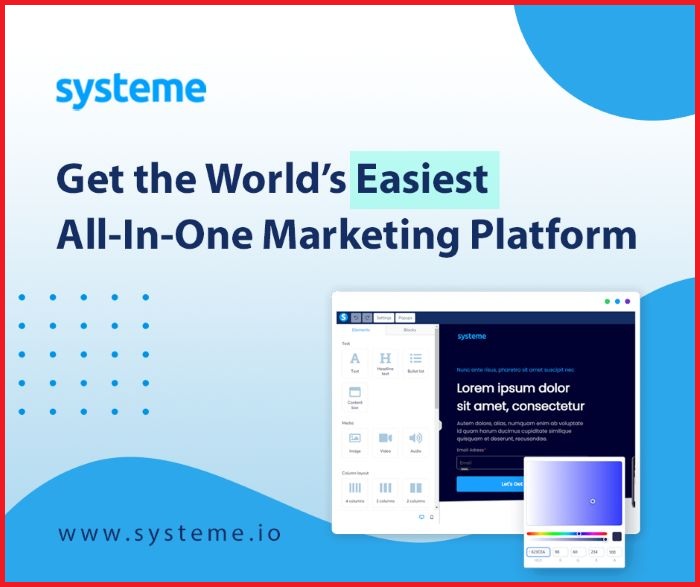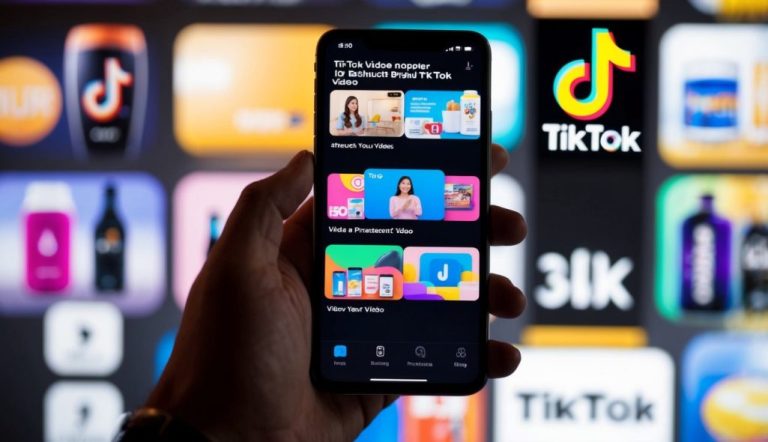Influencer marketing has reshaped the landscape of digital promotion, allowing brands to reach audiences more genuinely and engagingly. With the advancement of social platforms, tapping into the power of influencers who have already cultivated trust with your target market could transform your brand’s reach. To navigate this dynamic field effectively, you need cutting-edge influencer marketing tools that can help identify the right personalities for your brand, manage campaigns, and measure impact.

Navigating influencer marketing can be complex, but it’s made more straightforward with the correct tools. From analytics that provide insights into campaign performance to platforms that streamline finding and connecting with influencers, it’s essential to equip yourself with technology that simplifies these tasks. This allows for strategic planning and a tailored approach to influencer campaigns that resonate with your intended audience, strengthening your brand’s presence and effectiveness in the social media sphere.
Key Takeaways
- Influencer marketing tools streamline the identification and management of brand-influencer collaborations.
- Strategic applications of these tools enhance campaign planning and execution for targeted audience engagement.
- Analytics and reporting functionalities of such platforms are critical for measuring the success of influencer partnerships.
Understanding Influencer Marketing
In this section, you’ll discover influencer marketing, why it benefits your brand, and influencers’ critical function in the marketing landscape.
Defining Influencer Marketing
Influencer marketing involves partnering with individuals with a solid online presence to endorse your products or services. It’s a strategy that focuses on using the authority, knowledge, and relationship these influencers have with their audience to foster trust in your brand. This form of marketing capitalizes on the idea that consumers are more likely to trust a familiar face than traditional advertising.
Benefits for Brands
The primary advantages of influencer marketing for your brand include increased brand awareness and enhanced ROI. Harnessing the persuasive power of influencers can amplify your brand’s visibility within their engaged followership. This heightened exposure often translates into a higher return on investment than traditional advertising methods. Launching successful campaigns with influencers positions your brand in a space where people are already paying attention.
The Role of Influencers in Marketing
Influencers are the linchpins in this marketing strategy; they add a human touch to your campaigns. Their relatability and authenticity can often induce a sense of trust and loyalty from their followers. Influential influencers can transform brand awareness into tangible metrics, encouraging audience actions that range from following your brand’s social media accounts to making direct purchases. Their role is to authentically integrate your message into their regular content, naturally introducing their audience to your brand.
Influencer Marketing Tools Overview
Influencer marketing tools are designed to bolster your influencer marketing strategy by harnessing the power of social intelligence and analytics. This toolkit comprises software often centered around AI to help you locate and collaborate with influencers effectively.
Purpose of Influencer Marketing Tools
The primary goal of these tools is to simplify the multifaceted process of influencer marketing. They help you identify potential influencers and analyze their reach, engagement, and alignment with your brand values. Using software from companies like Sprout Social, you can gain insights from data-powered social intelligence that streamlines your campaign planning and execution.
Types of Tools Available
There is a diverse array of tools at your disposal, each offering unique functionalities:
- Discovery: Search and categorize influencers based on niche, reach, and audience demographics.
- Management: Aid in the administration of campaigns and relationships with influencers.
- Analytics: Offer detailed reporting on campaign performance and influencer effectiveness.
Companies like GRIN provide comprehensive guides comparing different tools, while platforms such as Upfluence focus on specific aspects like e-commerce integration. Other platforms, for example, Brandwatch and ClickUp, cater to the organized management of influencer relationships and marketing workflows.
Finding and Identifying Influencers

In the ever-evolving world of influencer marketing, your success hinges on pinpointing the right personalities to connect with your audience authentically. The right tools streamline this process, ensuring you find influencers who resonate with your brand values and reach your target demographics.
Search and Discovery Tools
To kickstart your journey, explore Upfluence’s free Chrome plugin, which helps you find influencers directly from your browser. Similarly, BuzzSumo is an excellent resource for influencer discovery; it highlights top content sharers, offering valuable insights into potential influencers already engaging with similar content.
Key Filters and Criteria
When identifying influencers, fine-tuning your search is crucial. Apply filters like location, keywords, and topics to narrow down prospects. This ensures the influencers you identify best fit your campaign’s geographical focus and subject matter. Tools like Brandwatch Influencer Marketing Software offer robust filtering options that refine your search, making identification more efficient.
Understanding Influence Metrics
Finally, don’t just count followers; dive into engagement rates and niche relevance with platforms like CreatorIQ to truly understand influence metrics. Assessing an influencer’s potential impact on your brand is vital by considering their audience’s responsiveness and the quality of interactions they inspire.
By leveraging these tools and approaches, you can confidently navigate the influencer landscape and create partnerships that foster authentic connections with your audience.
Influencer Marketing Strategic Planning
Creating a successful influencer marketing campaign starts with careful planning and strategy. Let’s dive into the essential steps you need to take.
Setting Campaign Goals
First, you need to define your campaign goals. Are you looking to increase brand awareness, drive sales, or launch a new product? Your goals will determine the type of influencers you collaborate with and the content you create. Remember that each goal should be SMART: Specific, Measurable, Achievable, Relevant, and Time-bound.
Budgeting and Cost Management
Next, establish a clear budget for your influencer marketing initiatives. Influencer partnerships can range from free product exchanges to expensive paid promotions; it all depends on the influencer’s reach and the complexity of the campaign. Use a spreadsheet to track expenses like influencer fees, production costs, and any ad spend to promote influencer content.
Choosing the Right Social Platforms
Finally, choosing the right social platforms is pivotal. Your target audience may spend more time on specific platforms like Instagram or TikTok, renowned for their engaging visual content. YouTube may be ideal for long-form content, while Twitch could be the platform of choice for live-stream interactions, especially in gaming communities. Each platform has unique features and audience demographics, so pick the one(s) that align with your marketing strategy and campaign goals.
Executing Influencer Campaigns
To successfully execute influencer campaigns, you must navigate through a meticulously planned workflow, create compelling content briefs, and precisely track performance to measure ROI. The goal is to manage your campaign efficiently, ensuring your content aligns with your brand, and you can analyze results effectively.
Campaign Workflow and Management
A defined campaign workflow is crucial to manage your influencer collaborations effectively. Critical elements like deadlines, deliverables, and communication channels should be laid out clearly in your campaign management plan. Tools such as Sprout Social streamline this process by allowing you to manage campaigns and relationships in one platform. Remember, well-organized management is the backbone of campaign success.
Content Creation and Briefs
Regarding content, your influencers need clear, concise briefs encapsulating your brand’s voice and objectives. Bullet points or short paragraphs explaining the campaign goals desired aesthetics, and any mandatory phrases or tags to include can significantly enhance content alignment with your brand. Use platforms like Mayple that help outline these briefs for optimal content creation.
Performance Tracking
Finally, tracking campaign performance helps understand your influencer partnerships’ ROI. Critical performance metrics should include engagement rates, conversion data, and audience growth. Platforms offering third-party analytics can assist in aggregating this data, allowing you to analyze results and refine future campaigns. The use of comprehensive tools found through sources like Influencer Marketing Hub can significantly aid in this quantification of success.
Building and Nurturing Influencer Relationships
Influencer marketing is as much about building genuine connections as it is about reaching audiences. Your success hinges on how well you can establish and manage these relationships.
Importance of Authentic Relationships
Creating authentic relationships with influencers is a cornerstone of effective influencer marketing. You want influencers to resonate with your brand so their endorsements feel genuine to their audience. Remember, a true partnership is a two-way street; value the influencer’s input and give them creative freedom within your brand’s parameters.
- Critical Factors for Authenticity:
- Trust: Show that you trust their expertise and content creation skills.
- Transparency: Be clear about your expectations and the goals of the partnership.
- Recognition: Acknowledge their hard work and the value they bring to your brand.
Relationship Management and CRM
Effective relationship management is facilitated using CRM (Customer Relationship Management) tools tailored to influencer marketing. These tools offer a centralized database to track all interactions and agreements with influencers, ensuring nothing falls through the cracks.
- Features of Influencer-Centric CRMs:
- Contact management: Keeps influencer contact details up to date and accessible.
- Campaign tracking: Monitors campaign progress and influencer contributions.
- Communication logs: Records exchanges for clarity and future reference.
For a deep dive into relationship management tools, visit websites like Influencer Marketing Hub.
By prioritizing authenticity and utilizing robust CRM systems, you can foster long-lasting influencer relationships vital for your brand’s narrative and growth.
Analytics and Reporting
In the dynamic field of influencer marketing, your ability to track analytics and generate comprehensive reports determines how well you can understand and leverage campaign results. Let’s explore the key elements you need for measuring campaign effectiveness, utilizing analytics tools, and creating insightful reports.
Measuring Campaign Effectiveness
To measure the effectiveness of your influencer campaigns, you need to scrutinize your engagement rate closely. This metric reflects how your audience interacts with the content, providing insight into its impact. Pay special attention to conversions to quantify the direct effects of campaigns on sales or desired actions. Tools like Grin might offer integration with your eCommerce platform to streamline this process.
Understanding Analytics Tools
When considering third-party analytics tools, prioritize those offering accurate data and comprehensive insights into audience demographics. These tools should help you dissect various components of your campaign, from follower engagement metrics to sales conversions. Choose tools like the ones detailed by Later, which can automate the process and provide in-depth audience insights and conversion tracking capabilities.
Creating Impactful Reports
Your reports are tangible representations of your campaign’s performance. They must be clear, concise, and visually engaging. Effective reports typically include elements such as:
- Engagement statistics: Utilize graphs to highlight growth or spikes in interaction.
- Conversion data: Present charts that correlate specific influencer activities with increases in sales or other conversion metrics.
- Audience insights: Include tables showing critical demographic information that can influence future marketing strategies.
You can precisely tailor your future influencer partnerships by harnessing tools from platforms like inBeat, which offer detailed metrics on past campaigns. Remember, your reports should reflect past performance and guide future decisions.
Enhancing Outreach Through Automation and AI
Automation and AI are game-changers in connecting with influencers, streamlining your outreach, and ensuring precise and timely communication.
Email Sequences and Communication
To maximize your outreach, you should incorporate email sequences that are both personalized and scalable. Utilize AI to segment your influencer list and send tailored messages, ensuring that each influencer feels like you’re speaking directly to them. By setting up automatic follow-ups, your engagement rates will likely increase, as consistent communication often leads to more successful collaborations.
AI-Driven Tools for Influencer Marketing
AI-driven tools can vastly improve your influencer marketing efforts. With machine learning algorithms, you can analyze influencer performance, matching your brand with the right personalities by examining engagement rates and audience demographics. For example, using influencer outreach tools, you can filter through an extensive database of influencers to find ones that align with your values and goals. AI can also help predict the success of your campaign, allowing you to allocate resources more effectively.
Social Listening and Market Research
Influencer marketing is not just about recruiting high-profile individuals to promote your brand; it’s a strategic approach to understanding and engaging with your audience. Through social listening and market research, you can harness the power of online conversations and digital trends to inform your marketing strategies.
Monitoring Brand Mentions and Trends
Social listening tools are essential for monitoring how your brand is mentioned across various social media platforms. You can gather real-time feedback and gauge public sentiment by tracking these brand mentions. Pay close attention to trending hashtags and social media trends, as they can reveal what’s capturing your audience’s attention. A proactive approach to social listening can lead to engaging content that resonates with current discussions and trends in the marketplace.
Example of tools in action:
- Brand Mention Alerts: Automatically receive notifications when your brand is mentioned.
- Hashtag Performance: Analyze which hashtags are gaining traction and apply them to leverage trending topics.
Competitor Analysis and Market Insights
Staying ahead of the game means watching your brand and your competitors. With competitor analysis features from various influencer marketing tools, you can uncover strategies that work for others in your industry. Market insights from these tools can inform your approach, allowing for data-driven decision-making. By understanding the strengths and weaknesses of your competitors, you ensure your brand remains competitive and pertinent in a crowded marketplace.
Table for Competitor Analysis:
| Feature | Benefit |
|---|---|
| Share of Voice | Measures your brand’s visibility compared to competitors. |
| Content Analysis | Evaluates the impact of content strategies across the market. |
| Market Trends | Spots shifts in industry trends and consumer preferences. |
Choosing the Right Influencer Marketing Platform
When venturing into the world of influencer marketing, selecting the right platform can streamline your strategy and amplify your results. It’s crucial to consider both the features offered and the usability of the software.
Critical Features to Look For
Influencer Discovery: An essential function of any influencer marketing platform is its ability to help you uncover influencers who resonate with your brand. Platforms like Upfluence and HypeAuditor provide robust search engines to locate influencers with the right audience.
Analytics and Reporting: In-depth analytics features enable you to measure the performance of your campaigns. Tools like GRIN and Klear deliver comprehensive reporting capabilities that offer insights into the effectiveness of your partnerships.
Campaign Management: The ability to manage and track your campaigns is critical. #Paid and Julius offers streamlined campaign management systems that save time and resources.
Relationship Management: Managing your interactions with influencers is more accessible with platforms like CreatorIQ and Traackr, which provide relationship management tools to help you build and maintain partnerships.
Ease of Use and User Experience
- Intuitive User Interface (UI): The best influencer marketing software should have an intuitive UI that doesn’t require extensive training. Impact.com focuses on delivering a user-friendly experience.
- Customer Support: Good customer support is invaluable. Look for platforms that offer comprehensive support and training materials, such as Neoreach, which provides resources to help get the most from their platform.
By focusing on these critical aspects, you can select an influencer marketing platform that aligns with your strategy and enhances your marketing efforts through a smooth and enjoyable user experience.
Legal Considerations and Compliance
Navigating the complexities of legal considerations and compliance is crucial for your influencer marketing campaigns. You need to ensure adherence to laws and guidelines to protect your brand and maintain trust with your audience.
Understanding FTC Guidelines
The Federal Trade Commission (FTC) sets the rules for advertising practices in the United States, including influencer marketing. Your promotional content about endorsements and partnerships must be transparent. FTC guidelines require disclosing any material connection between an influencer and your brand. Here’s a brief rundown:
- Disclosures should be clear: Don’t bury them in hashtags or small text.
- Be honest about the relationship: Whether it’s a free product, payment, or a discount, disclose it.
Remember, rules can vary across different platforms, but transparency is critical.
Handling Contracts and Agreements
Contracts and agreements form the backbone of any influencer marketing partnership. They clarify expectations, deliverables, and legal responsibilities. To avoid potential disputes or breaches of contract:
- Clearly outline terms:
- Define the scope of work
- Specify compensation and payment terms
- Address content ownership and usage rights
- Cover the liabilities:
- Determine responsibility for legal issues
- Spell out any warranties or indemnification clauses
Contracts should ideally be vetted by legal professionals familiar with influencer marketing. Ensure every point is understood before agreements are signed. This proactive approach can save you a great deal of time and resources.
Frequently Asked Questions
Exploring the realm of influencer marketing can raise numerous questions, particularly for those new to the strategy. Here, you’ll find specific answers to common queries to help you navigate the process.
What are the top influencer marketing platforms suitable for small businesses?
Your budget might not be significant, but influencer marketing options are tailored to small businesses. Platforms like Grin and Upfluence offer scalable tools and pricing to match your business size and needs.
How can I find influencers effectively for my marketing campaigns?
To locate the right influencers for your brand, leverage technology like GRIN or Upfluence, which offers databases and search tools to match your campaign goals with the ideal influencer profiles.
Could you recommend any free influencer marketing tools to get started with?
While many tools require a subscription, starting with free versions or trials can be beneficial. Tools like Hootsuite and AspireIQ offer basic functionalities or trial periods that allow you to dip your toes in influencer marketing without a financial commitment.
What are the best influencer marketing tools for tracking and analyzing influencer campaigns?
Efficiently measuring your influencer campaign ROI is crucial, and tools like Upfluence and HYPR can provide in-depth analysis and tracking to understand the impact of your influencer partnerships.
How can influencer marketing strategies be implemented for optimum engagement?
To keep your audience engaged, tailor your campaigns to match your brand’s voice and the influencer’s style. A clear objective and actionable KPIs will drive focus, whether it’s increasing brand awareness or driving sales.
What attributes should one look for in an influencer marketing agency?
When picking an influencer marketing agency, consider their understanding of your niche, their track record with past campaigns, and how well they can connect with your target audience to turn influence into action.





